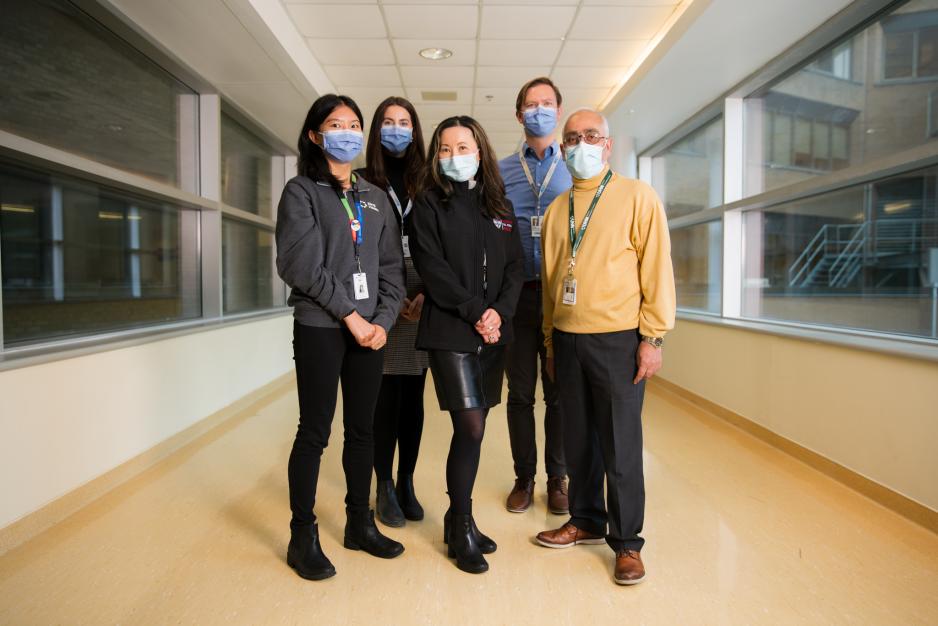Representatives from U of T’s Pharmacy Students for Antimicrobial Stewardship Society, a student-led organization dedicated to raising awareness of antimicrobial stewardship
Pharmacists play important roles in ensuring antimicrobials are used appropriately to slow resistance
Antimicrobial resistance may be one of the biggest challenges that health care may face in the future. It has been a growing problem for years, and the COVID-19 pandemic has made it worse as more antimicrobials were prescribed in the early stages of the pandemic. Some estimates project that by 2050, more people will die of antimicrobial-resistant infections than cancer.
Pharmacists are playing key roles in using antimicrobials responsibly to counter antimicrobial resistance and adapt to a changing environment.
“We’re going to have to adapt, and that adaptation means we’ll have to use more expensive medications that are not tolerated as well or are harder to get,” says Mark McIntyre, pharmacotherapy specialist at the Sinai Health – University Health Network Antimicrobial Stewardship Program and adjunct lecturer at the Leslie Dan Faculty of Pharmacy. “The changes will be incremental and result in a subtle but important shift in how we would do our day-to-day work.”
Part of McIntyre’s work with the Antimicrobial Stewardship Program is educating health care professionals about how to treat antimicrobials as a precious resource and use them appropriately.
"They are an option, but they aren’t the only option.”
“We know that antimicrobials are really important, we need to use them many times, and some patients really need them,” says McIntyre. “But the culture of prescribing needs to change. We shouldn’t think about antimicrobial treatment as a binary – either we use it avoid it – but more of a continuum. They are an option, but they aren’t the only option.”
For pharmacists, that could mean working with prescribers and patients to ensure that antimicrobials are prescribed at an appropriate dose for an appropriate length of time.
But McIntyre says pharmacists’ real value lies in using proactive strategies to educate and support physicians and patients before the prescription is written, not by reacting to each individual prescription.
“We can use our time and our public-facing practice model to showcase the things that we are doing right now that are antimicrobial stewardship measures,” says McIntyre. “From a pharmacist perspective, these proactive strategies are where we will get the most bang for our buck and where we need to put our efforts.”
This means proactively educating physicians and patients about when and how antimicrobials should be used before they need them, offering vaccinations to prevent illness that could eventually require antimicrobials, and helping patients manage symptoms at home without antimicrobial treatment.
As an easily accessible health care professional, pharmacists are ideally positioned to work with both physicians and patients. For example, instead of filling an entire 14-day prescription of antibiotics, a pharmacist could fill a few days then reassess the patient, helping patients get the care they need, providing support and education to physicians, and ultimately reducing antimicrobial use.
Stewardship is part of patient-centred care
McIntyre’s research with the Antimicrobial Stewardship Program focuses on behaviour change and decision-making as they relate to antimicrobial prescribing.
Fourth-year Doctor of Pharmacy student Jaspreet Ghataura works with McIntyre on one such project, evaluating how anesthesiologists and surgeons share decision-making and resolve conflicts around prophylactic antimicrobial use during surgery.
She says that initially she was hesitant to work with antibiotics, but an early practice experience (EPE) rotation at Brampton Civic Hospital focused on antimicrobial stewardship kickstarted her interest in the field.
“Over the course of the rotation, my preceptor guided me through the different types of antibiotics and their spectrum of coverage, shining a light on how important stewardship is,” Ghataura says. “I was interested in how every infection is different, how much there is to antimicrobial stewardship, and the impact pharmacists can make.”
After that rotation, she took an antimicrobial stewardship course at the Leslie Dan Faculty of Pharmacy and started working with McIntyre’s research group. She has become enthusiastic about antimicrobial stewardship and plans to incorporate it into her future career, wherever she ends up practising, and she is particularly excited about how antimicrobial stewardship is a part of providing patient-centred care.
“Every case is unique. You are looking at the patient as a whole – their medical history, current living situation and medical needs – and what seems to be a simple infection could have so many variations,” she says. “Every patient will require different management and monitoring, and you have to take your learnings and adapt them to make sure each patient receives optimal care and appropriate antimicrobial use.”
Antimicrobial stewardship not an “in-the-moment” strategy
The COVID-19 pandemic has provided a painful lesson in how quickly pathogens can spread around the world and the impact that these pathogens can have on the entire health care system. As members of the Antimicrobial Stewardship Program write in Healthy Debate, cancer treatments, organ transplantations, and even routine surgeries such as knee and hip replacements will become far more risky as resistance increases, and resistant pathogens may spread between patients to affect entire wards and health care facilities. Antimicrobial resistance presents a significant challenge and will require all health care professionals to work together every day toward the goal of slowing resistance.
“My job is not to prevent people from using antimicrobials. My job is to change culture, so everybody – clinicians, pharmacists and patients – realize they can use less. And when we use less antimicrobials, they start working better,” says McIntyre. “Most health care professionals think of antimicrobial stewardship as an action or an in-the-moment strategy. But it’s actually a systematic, strategic way of interacting with the people that you work with to achieve a long-term change.”
More News
Image

Pharmacy alum sees change in acceptance of Indigenous cultures in health care
During Deborah Emery’s 40-year pharmacy career, she provided care in Sioux Lookout, Thunder Bay and Manitoulin Island.
Read More
Image

Grad to Watch: Jackie Fule Liu’s research focuses on better outcomes for diabetes patients
A recent PhD graduate, Jackie Fule Liu combines hands-on skill and big-picture thinking to help tackle diabetes care challenges.
Read More
Image

U of T community members recognized with Order of Canada
Congratulations to Dean Emeritus and Professor K. Wayne Hindmarsh on his appointment.
Read More


